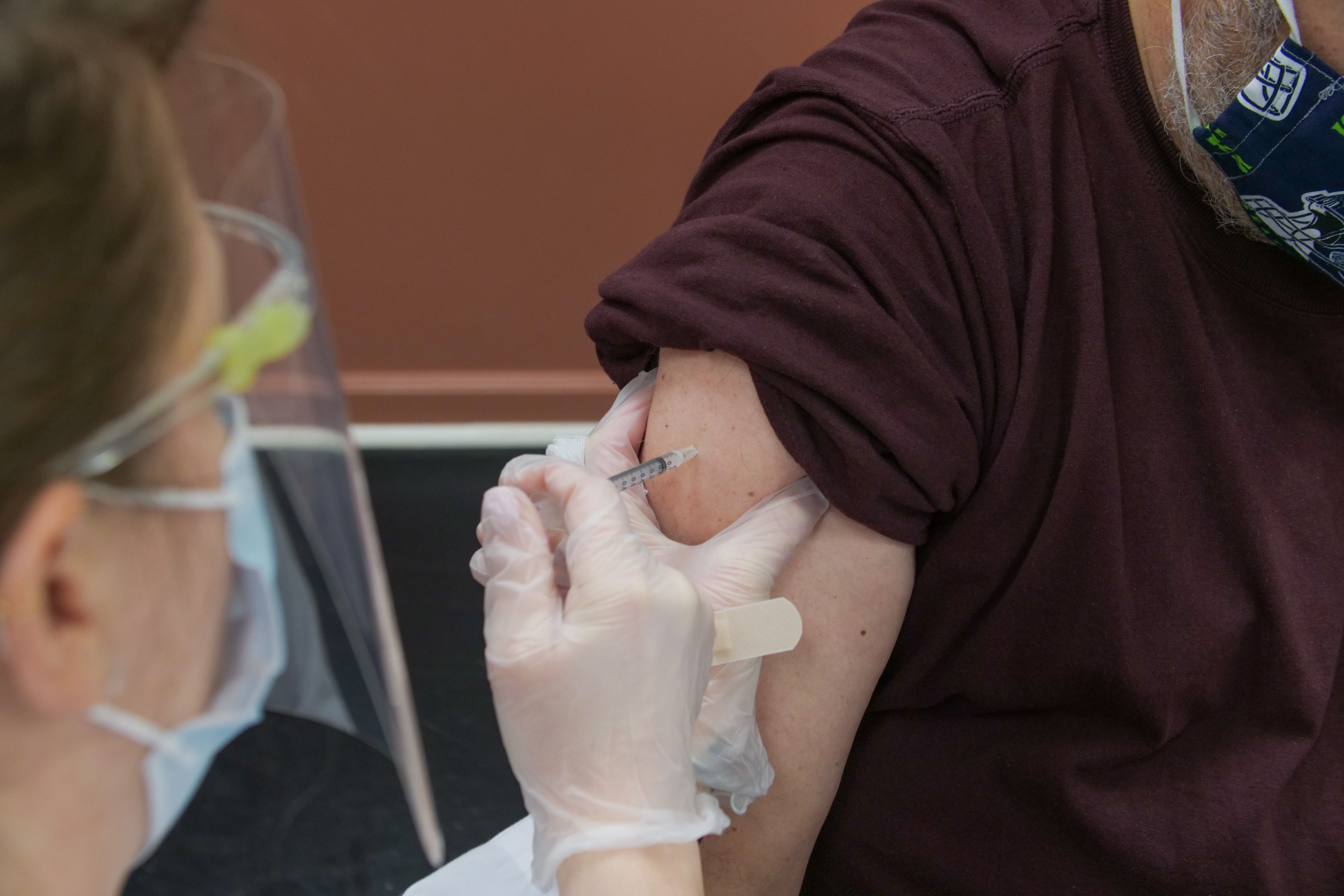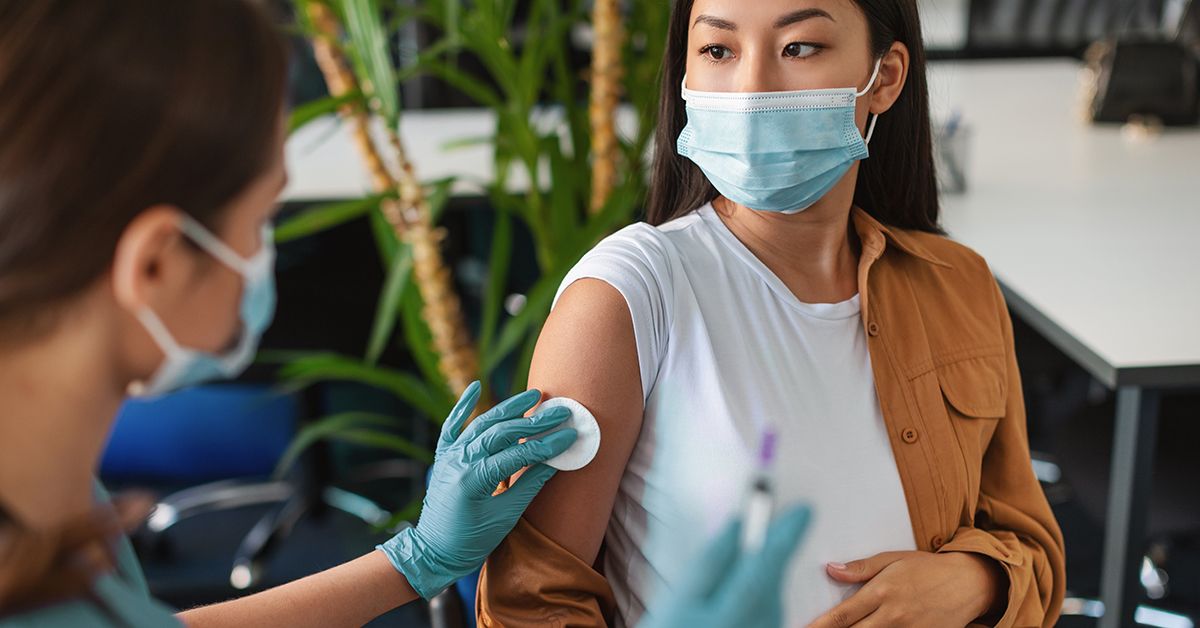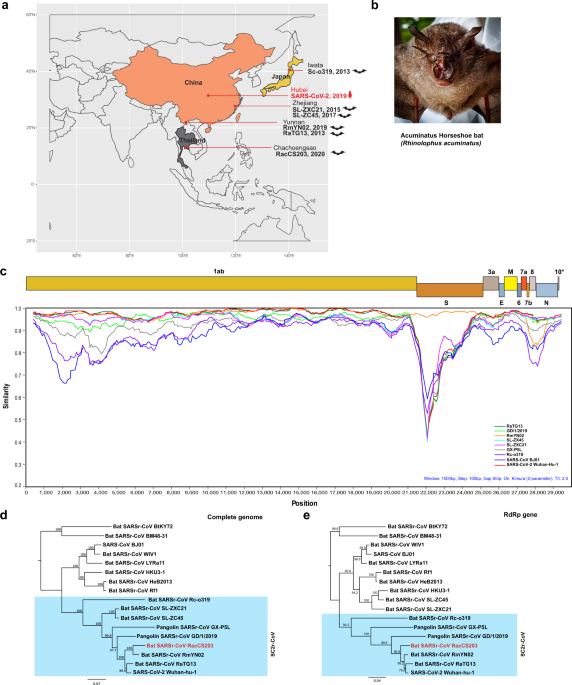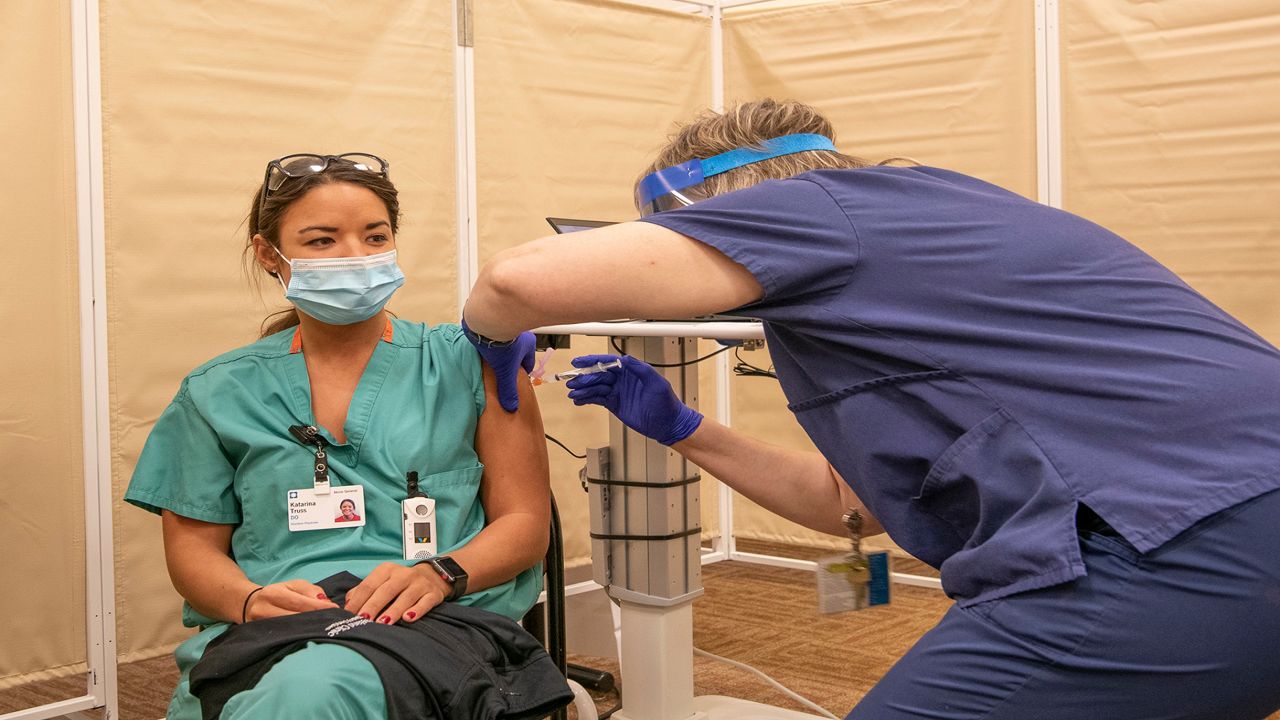Why would I get a vaccine that will certainly make me feel sick and that might not even stop me from getting covid?
Because it could save your life and prevent you from spreading it to others
It doesn't prevent the spread. It merely "reduces" it, and that barely. Don't you know?
Routine screening of employees at St. Jude Children’s Research Hospital show lower rates of asymptomatic SARS-CoV-2 infection among vaccinated workers.

www.contagionlive.com
What vaccines do is reduce successful transmissions. To survive, virus particles much reach a host that has not become immune either through vaccination or previous infection. The more people that have been vaccinated, the harder it is for the virus to spread. The primary method of transmission is expelled droplets carrying the virus. These droplets dry and dissipate as air currents move them so they must hit on suitable hosts typically within minutes. The more people that are vaccinated the harder it is for the virus to a reach suitable hosts. If 100% of a population has become immunity by vaccinations, there will be no suitable hosts. Since we will never reach 100%, there will always be tiny bit of the virus remaining. The Spanish influence epidemic was over 100 years ago, yet the virus still exist.
Vaccines do not at all in any way prevent infection.
All they do is quicken the ability of the immune response to kill the infection.
That does reduce successful transmission, but on the sending side, not on the receiving side.
The receiver is not going to be producing antibodies all the time, and instead will only produce them AFTER an full infection has taken hold.
And actually, we likely only need 70% immunity, by recovery, vaccination, or inherent immunity, in order to wipe out the covid-19 virus forever.
And there will be no "tiny bit of virus remaining".
Covid-19 is not endemic to humans and is only barely able to survive in humans, with a maximum time being about 2 weeks.
So it should have been easy to eliminate this virus last year.
The Spanish flu is endemic to humans, and has been around continually.
It is not at all like covid-19 except that we also prevented the Spanish flu from going away, by "flattening the curve". " Vaccines do not at all in
I agree, viruses do not prevent infection. However, I think you're being a bit picky. The more accurate statement is the vaccine enables the immune system to prevent infection.
Only two infectious diseases have been successfully eradicated, Smallpox in humans and Rinderpest in cattle and buffalos. It took about 200 years and a worldwide vaccination program to eradicate Small Pox. It only took only 60 years to eradicate rinderpest which was far easier since it only affected cattle and buffalos and they didn't have an option of saying no to the vaccine.
Spanish Influenza which killed at least 50 million worldwide was caused by the H1H1 virus. By 1920, most countries were probably at or close to herd immunity and governments pronounced an end to the epidemic, primarily to stimulate commerce. Since there was no vaccine, H1NI continued but it was not referred to as the Spanish Influenza, just a bad case of the flu. It was not till the late 1930's that H1N1 was discovered and credited with the Spanish Influenza. A vaccine was created in the 50's and it is now part of the yearly flu vaccine we take in the US. H1N1 has reached epidemic proportions a number of times. Swine Flu was a strain of H1N1 which killed millions and is still around today and continues to produce new strains.
H1N1 is a great example as to why we should eradicate this virus. If we just reduce hospitalizations and deaths so that we consider it a minor health problem, it will continue to replicate and eventually throw off a new very deadly strain. Like H1N1, it will rise again. We have developed one the most effect vaccines ever and we could eliminate covid-19 forever but only if we continue to vaccinate which seems very unlike once we feel it is under control.
But H1N1 is endemic to humans.
It can live indefinitely in humans, partially by hiding from the immune system, and partially by not causing enough harm to cause the loss of a host.
Covid-19 is not endemic to humans because it can't survive in a human for more than about 2 weeks.
It irritates the immune system to easily and also causes host death too easily.
So the only way covid-19 is going to come back is if we again interact with its endemic hosts in nature, the bat.
And since covid-19 is endemic to bats, (and maybe pangolins), we can never get rid of it.
We would have to vaccinate all the bats.
Some strains of H1N1 are endemic in humans and cause a small fraction of all influenza-like illness and a small fraction of all seasonal influenza
Why would I get a vaccine that will certainly make me feel sick and that might not even stop me from getting covid?
Because it could save your life and prevent you from spreading it to others
It doesn't prevent the spread. It merely "reduces" it, and that barely. Don't you know?
Routine screening of employees at St. Jude Children’s Research Hospital show lower rates of asymptomatic SARS-CoV-2 infection among vaccinated workers.

www.contagionlive.com
What vaccines do is reduce successful transmissions. To survive, virus particles much reach a host that has not become immune either through vaccination or previous infection. The more people that have been vaccinated, the harder it is for the virus to spread. The primary method of transmission is expelled droplets carrying the virus. These droplets dry and dissipate as air currents move them so they must hit on suitable hosts typically within minutes. The more people that are vaccinated the harder it is for the virus to a reach suitable hosts. If 100% of a population has become immunity by vaccinations, there will be no suitable hosts. Since we will never reach 100%, there will always be tiny bit of the virus remaining. The Spanish influence epidemic was over 100 years ago, yet the virus still exist.
Vaccines do not at all in any way prevent infection.
All they do is quicken the ability of the immune response to kill the infection.
That does reduce successful transmission, but on the sending side, not on the receiving side.
The receiver is not going to be producing antibodies all the time, and instead will only produce them AFTER an full infection has taken hold.
And actually, we likely only need 70% immunity, by recovery, vaccination, or inherent immunity, in order to wipe out the covid-19 virus forever.
And there will be no "tiny bit of virus remaining".
Covid-19 is not endemic to humans and is only barely able to survive in humans, with a maximum time being about 2 weeks.
So it should have been easy to eliminate this virus last year.
The Spanish flu is endemic to humans, and has been around continually.
It is not at all like covid-19 except that we also prevented the Spanish flu from going away, by "flattening the curve". " Vaccines do not at all in
I agree, viruses do not prevent infection. However, I think you're being a bit picky. The more accurate statement is the vaccine enables the immune system to prevent infection.
Only two infectious diseases have been successfully eradicated, Smallpox in humans and Rinderpest in cattle and buffalos. It took about 200 years and a worldwide vaccination program to eradicate Small Pox. It only took only 60 years to eradicate rinderpest which was far easier since it only affected cattle and buffalos and they didn't have an option of saying no to the vaccine.
Spanish Influenza which killed at least 50 million worldwide was caused by the H1H1 virus. By 1920, most countries were probably at or close to herd immunity and governments pronounced an end to the epidemic, primarily to stimulate commerce. Since there was no vaccine, H1NI continued but it was not referred to as the Spanish Influenza, just a bad case of the flu. It was not till the late 1930's that H1N1 was discovered and credited with the Spanish Influenza. A vaccine was created in the 50's and it is now part of the yearly flu vaccine we take in the US. H1N1 has reached epidemic proportions a number of times. Swine Flu was a strain of H1N1 which killed millions and is still around today and continues to produce new strains.
H1N1 is a great example as to why we should eradicate this virus. If we just reduce hospitalizations and deaths so that we consider it a minor health problem, it will continue to replicate and eventually throw off a new very deadly strain. Like H1N1, it will rise again. We have developed one the most effect vaccines ever and we could eliminate covid-19 forever but only if we continue to vaccinate which seems very unlike once we feel it is under control.
But H1N1 is endemic to humans.
It can live indefinitely in humans, partially by hiding from the immune system, and partially by not causing enough harm to cause the loss of a host.
Covid-19 is not endemic to humans because it can't survive in a human for more than about 2 weeks.
It irritates the immune system to easily and also causes host death too easily.
So the only way covid-19 is going to come back is if we again interact with its endemic hosts in nature, the bat.
And since covid-19 is endemic to bats, (and maybe pangolins), we can never get rid of it.
We would have to vaccinate all the bats.
You said." the only way covid-19 is going to come back is if we again interact with its endemic hosts in nature, the bat." Since you are assuming it could come back, then you must believe that it will it be eradicate. I do not believe that will happen at least not in the foreseeable future for several reasons. The virus cannot be completely eradiated because we simple will not be able to reach herd immunity throughout the world. Once the disease and deaths have reached and acceptable level, the vaccinations will stop and the virus will begin to spread again. Epidemics will pop up from time to time indefinitely. Also, high rates of replication and this virus’s rate of mutation makes it very likely that before this virus is contained in the world, we will be dealing with a lot of dangerous strains.
We still don’t know the origins of the coronavirus so your assumption that it comes from bats is a supposition. The virus (SC2r-CoVs) found in bats in China was a member of the coronavirus family but not the virus that causes Covid-19. There is some evidence that indicates SC2r-CoVs could have jumped species and became SARS-CoV-2 in humans. However, there are other possibilities that scientists are investigating.
- Direct spillover from animals such as bats to humans
- Spillover from other animals to humans through an intermediate host
- Introduction through refrigerated or frozen foods
- Laboratory leaks
Experts say that understanding how the virus first leapt from animals to humans is essential to preventing future pandemics.

www.nationalgeographic.com
Since the virus found in bats in China is not the same virus that causes Covid-19 and we don't know if there was a species jump to humans your statements about it are not relevant.
I disagree that we don't know that covid-19 is endemic to bats only.
First of all there is the circumstantial evidence that it can't be endemic to any animal we come in common contact with, or else we would have been very familiar with it by now. Second is the pathology of it being immune to fever heat, which then pretty much limits its natural host to something with a high metabolism, like birds or bats. Third it that the known bat strains are the closest match. Not identical, but very close. If we checked more bats, we likely would find an exact match.
But it does not matter, since all we care about is that it is not endemic to humans. It is very fragile and easily killed by the human immune system. It can't survive for more than 2 weeks in a human host. It is not good enough at hiding. So it will never become endemic to humans unless a strain evolves that is much less lethal.
I am sure covid-19 will be eradicated in humans. It should have been eradicated last March. They only reason why it wasn't, is that we deliberately rationed out easy hosts for it, in order to keep it alive and well. If we had not "flattened the curve", then we would have reach herd immunity in the first month.
Your mistake is counting only on vaccination for immunity, and normally all epidemics are ended without any vaccine immunity.
It is only inherent and acquired immunity from recovery that ends all epidemics normally.
If the vaccinations stop, infection does NOT start to increase.
The % immune will still be increasing from acquired recovery immunity, so eventually the virus will disappear in all humans.
That is always what has happened to all epidemics.
And I also disagree that covid-19 or any virus has a high mutation rate.
Mutations are random changes, like from radiation.
They are almost always just destruction and make the RNA non-viable.
That is NOT what the variants are coming from.
There are 2 possible sources of variants.
One is that they came from mutations, but over millions of years, since that is the time frame you need to accidentally get a mutation that is viable. They did not recently mutate, but just recently become more common, out of recent natural selection.
The second possibility is that they are not mutations at all, but hybrids. That may sound strange since a virus is not sexual reproduction, but more than one virus can inject its RNA into the same host nucleus, and when that happens, it is possible for the RNA to combine in different ways.
www.cdc.gov



:max_bytes(150000):strip_icc()/GettyImages-148614212-5941931b5f9b58d58acd6755.jpg)

